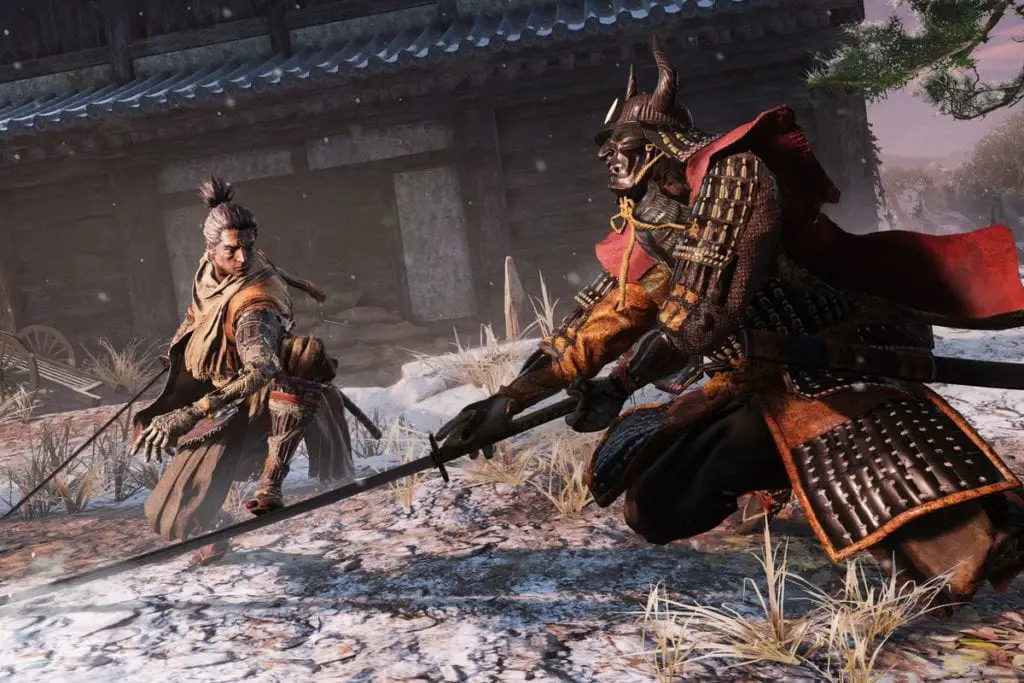Earlier this year, a little game called Sekiro: Shadows Die Twice released and created a minor controversy within the gaming community. As the latest release by From Software famed torturers of hardcore gamers responsible for the Dark Souls series and Bloodborne, Sekiro obviously presented a significant challenge to even From veterans. This led some gamers and journalists to call for the addition of an “easy mode” to the game.
Fans of the game and From’s other entries responded viciously, and gamers had a debate on their hands. Should every game focus on making itself accessible to everyone? What place exists in modern gaming culture for niche games like Sekiro? Eventually this led to that stupid, pesky argument about what makes a real gamer.
For my part, I supported the Sekiro fans who hated the idea of an easy mode.

Sekiro was not made to include an easy mode. Put aside the work involved to include an easier mode, as the entire game would need to be rebalanced to make this mode work, or the way it cheapens the point of the game From made if they include an easy mode. Games like this have a place in the gaming world. They serve a specific audience. Asking for an easy mode to appeal to all gamers is like asking Steven Universe to include sex and violence to appeal to fans of HBO dramas, or demanding Taylor Swift include thrash metal in her new album.
Different games are created for different gamers. I’m sorry if Sekiro’s challenge turned you away. However, not every game is going to appeal everyone. Let people play what they want to play, and let developers appeal to the audience they wish to appeal to.
Of course, a significant undercurrent of the “easy mode” push was the feeling that Sekiro fans are “gatekeepers” for the gaming world. It’s a perfect example of the kind of game attracting bratty, snobbish gamers who hold it up as “a real gamer’s game,” one that you should love if you’re a “real” gamer. You’re just a fake Candy Crusher if you don’t suffer playing a hard game like this.
And if anyone doubted the way this attitude pervades and persists in the gaming community, you need only look at Hideo Kojima’s upcoming new release, Death Stranding.
Ahead of this year’s Tokyo Game Show, Kojima announced the inclusion of a “Very Easy” difficulty mode for Death Stranding. He wanted a mode for people who want to experience the story but either don’t play games much or aren’t very good at them. It made sense. Kojima’s games tend to be like giant movies, with huge cutscenes making up much of the game’s playtime. He has always included easy difficulty modes in his games. This one sounds even easier than what he typically includes, but I understand his reasoning.
Naturally, the gatekeeper gamers were quick to pounce. They talked down to anyone who might need an easy mode in a game. They talked as if very easy modes were some new phenomenon betraying the history of video games. Over and over, I saw exactly tweets and comments proving every supporter of a Sekiro easy mode correct. The same gamers who demanded people just let them have the games they want were quick to turn around and tell other people they couldn’t have the same.
What especially proves annoying is the sheer ignorance of video game history I saw among people angry over Death Stranding’s easy mode announcement. Gamers talk about some fabled, nonexistent past where games were tough and gamers were better because we were tough and cool and would spend all day mastering them. Old school games were superior because old school gamers were superior.
It’s the kind of ridiculous argument that reminds me of the backlash against the She-Hulk show. The loudest gatekeepers for a hobby tend to be the most ignorant about the history they claim to protect.
Games were generally tougher once upon a time, but only out of necessity. They usually didn’t have huge, complex plots. They typically didn’t include 40-50 hours of content. Games were an hour or two long and had to artificially inflate the difficulty through cheap, frustrating gameplay in order to justify a purchase. Arcade games created cheap, mind-numbing difficulty because they were squeezing quarters out of you.
Even then, many games had easier difficulty modes, so what exactly is the complaint? If I sucked at Street Fighter II: Championship Edition, I could set the difficulty to something easier. I did, because I was a kid who just wanted to beat the game.
Games have gotten generally easier, sure, because they’re no longer designed around artificially inflating the amount of time it takes to beat them. Technology allows for many different types of games that can include a lot more content to keep us playing games for longer. They can explore storytelling in different ways. They can appeal to different games in many different ways.
Sekiro and Death Stranding are polar opposite examples of the exact same problem. Their controversies ultimately represent a struggle over the idea of “real” gamers and the future of the medium. They represent two sides struggling for control when, ultimately, the struggle is just plain stupid and counterproductive.

I understand both sides. For gaming “purists” they worry about the loss of creativity in the gaming industry. As it becomes more popular, they worry gaming companies will increasingly pump out bland, similar titles with the same production values and gameplay in an effort to appeal to the largest audience possible. Ironically, games like Death Stranding will fall to the wayside. Weird games, hard games, indie games, it will all be lost to the almighty dollar borne from gaming’s increasing popularity.
Frankly, I suggest people go back and look at the so-called variety in old-school gaming. Yeah, you’ll start recognizing how basically every game was a clone of whatever sold the most at that time. Not so different from the industry today.
Still, I get it. You can see how popular trends focused on profit will sometimes make gaming worse. The games-as-a-service model has already caused the loss of potentially fantastic content we otherwise would have seen. Developers can go years without releasing new games when they hit on a continuous revenue stream. Exciting single-player content will be abandoned, as seen with Grand Theft Auto V. Promising concept for games like Dragon Age 4 will be abandoned in favor of a games-as-a-service model (link here).
As gaming continues to grow in popularity and comes with increasing potential profits, there is a legitimate fear about what this will mean for the games being made. Does this excuse the behavior of the more hardcore gaming crowd? Not at all. It especially doesn’t help when they focus on such trivial issues as difficulty modes. It’s easier for game publishers to win the PR battle for their worst ideas when they can dismiss complaints as coming from people who just want to discriminate against casual gamers.
There very much is a section of the gaming community that does want to discriminate against other gamers. These are the people behind Gamergate, who want gaming to be a “boy’s” hobby closed to women or people of color. It’s the same inspiration behind the vocal minority of The Last Jedi critics whose main problem was not the direction or story, but having women and people of color in hero roles.
Video games were a haven for geeks for a long time, and much like comics, there are a decent number of terrible people among those geeks who want to transfer their bullying onto others.
I am very much in favor of the increasingly popularity of video games, and the increasing inclusivity that comes along with it. As such, I understand the good intentions behind Sekiro critics wanting an easy mode. They want a game with such praise and such good content to be available to a larger audience. If you want the gaming industry to grow, you will have to make big-budget games accessible to a larger audience.
However, the Sekiro controversy took things too far. Certainly not on the level of Gamergate or anything, but it very much parallels the Death Stranding controversy. It was a group of people arguing against the existence of games designed for niche audiences. Even gaming journalists jumped onto this side of the argument.
I am sensitive to the argument in this article regarding physically-disabled gamers. They have the exact same rights to enjoy video games as anyone else. I still believe that games like Sekiro should be left alone. There are plenty of games offering a similar aesthetic and gameplay style to Sekiro that people who find it too difficult can enjoy. In the future, the gaming industry can and should create games or modes specifically for physically-disabled gamers.
There should still exist a niche area for types of games From Software makes. The same is true of Death Stranding, and no one should be shamed or considered to not be a real gamer for playing on an easy difficulty. Platformers should not have to appeal to RPG fans. Fighting games shouldn’t have to appeal to shooter fans. Some games should be allowed to be hard, and some should be allowed to be easy. Variety is a good thing.
Both Sekiro and Death Stranding represent variety in the industry, and their respective controversies both represent an attack on said variety.
The video game industry is young and still searching for the same legitimacy and accepted popularity as other forms of entertainment. This transition from a niche hobby to mainstream popularity always brings rough patches where the “purists” and “casuals” clash. Even after a hundred years as a medium, comic books still deal with this nonsense. Even more so now that they’ve crossed over to mainstream movie success.
In the end there’s no such thing as a “real” gamer. If you only play mobile games on your phone, you’re a gamer. On the other hand, there’s still the lingering stigma against people who play games more seriously. Say, those who suffer and die through Sekiro over and over. That shouldn’t exist, either.
Just let people play what they want to play and stop shaming or criticizing them. Is that really so difficult a concept?

